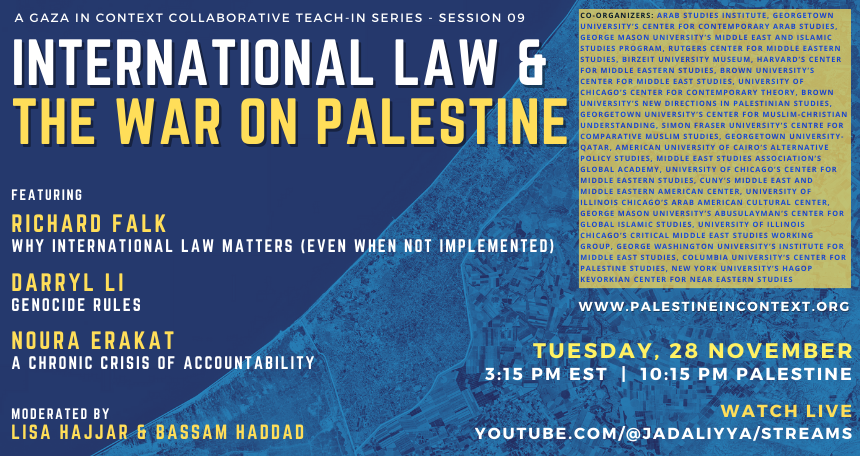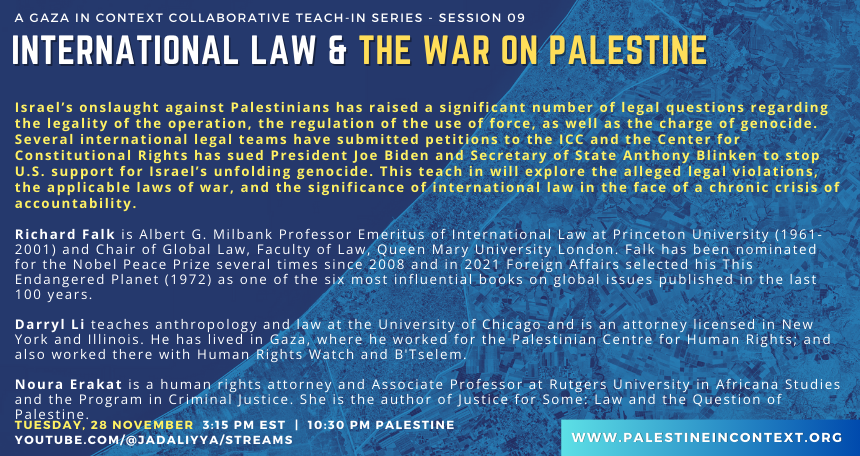Gaza in Context: A Collaborative Teach-In Series — Session 09
International Law & The War on Palestine
Featuring:
Richard Falk: Why International Law Matters (Even When Not Implemented)
Darryl Li: Genocide Rules
Noura Erakat: A Chronic Crisis of Accountability
Moderators:
Lisa Hajjar
Bassam Haddad
Teach-In Session 09
Israel's onslaught against Palestinians has raised a significant number of legal questions regarding the legality of the operation, the regulation of the use of force, as well as the charge of genocide Several international legal teams have submitted petitions to the ICC and the Center for Constitutional Rights has sued President Joe Biden and Secretary of State Anthony Blinken to stop U.S. support for Israel's unfolding genocide. This teach in will explore the alleged legal violations, the applicable laws of war, and the significance of international law in the face of a chronic crisis of accountability.
Gaza in Context Collaborative Teach-In Series
We are together experiencing a catastrophic unfolding of history as Gaza awaits a massive invasion of potentially genocidal proportions. This follows an incessant bombardment of a population increasingly bereft of the necessities of living in response to the Hamas attack in Israel on October 7. The context within which this takes place includes a well-coordinated campaign of misinformation and the unearthing of a multitude of essentialist and reductionist discursive tropes that depict Palestinians as the culprits, despite a context of structural subjugation and Apartheid, a matter of consensus in the human rights movement.
The co-organizers below are convening weekly teach-ins and conversations on a host of issues that introduce our common university communities, educators, researchers, and students to the history and present of Gaza, in context.
Co-Organizers: Arab Studies Institute, Georgetown University’s Center for Contemporary Arab Studies, George Mason University’s Middle East and Islamic Studies Program, Rutgers Center for Middle Eastern Studies, Birzeit University Museum, Harvard’s Center for Middle Eastern Studies, Brown University’s Center for Middle East Studies, University of Chicago’s Center for Contemporary Theory, Brown University’s New Directions in Palestinian Studies, Georgetown University’s Center for Muslim-Christian Understanding, Simon Fraser University’s Centre for Comparative Muslim Studies, Georgetown University-Qatar, American University of Cairo’s Alternative Policy Studies, Middle East Studies Association’s Global Academy, University of Chicago’s Center for Middle Eastern Studies, CUNY’s Middle East and Middle Eastern American Center, University of Illinois Chicago’s Arab american cultural Center, George Mason University’s AbuSulayman’s Center for Global Islamic Studies, University of Illinois Chicago’s Critical Middle East Studies Working Group, George Washington University’s Institute for Middle East Studies, Columbia University’s Center for Palestine Studies, New York University’s Hagop Kevorkian Center for Near Eastern Studies


Featuring
Richard Falk is Albert G. Milbank Professor Emeritus of International Law at Princeton University (1961-2001) and Chair of Global Law, Faculty of Law, Queen Mary University London. Falk has been nominated for the Nobel Peace Prize several times since 2008 and in 2021 Foreign Affairs selected his This Endangered Planet (1972) as one of the six most influential books on global issues published in the last 100 years.
Darryl Li teaches anthropology and law at the University of Chicago and is an attorney licensed in New York and Illinois. He has lived in Gaza, where he worked for the Palestinian Centre for Human Rights; and also worked there with Human Rights Watch and B'Tselem.
Noura Erakat is a human rights attorney and an Assistant Professor at Rutgers University, New Brunswick Department of Africana Studies. Her research interests include humanitarian law, refugee law, national security law, and critical race theory. Noura is the author of Justice for Some: Law As Politics in the Question of Palestine (Stanford University Press, 2019). She is a Co-Founding Editor of Jadaliyya e-zine and an Editorial Committee member of the Journal of Palestine Studies. She has served as Legal Counsel for a Congressional Subcommittee in the House of Representatives, as a Legal Advocate for the Badil Center for Palestinian Refugee and Residency Rights, and as the national grassroots organizer and legal advocate at the US Campaign to End the Israeli Occupation. Noura is the coeditor of Aborted State? The UN Initiative and New Palestinian Junctures, an anthology related to the 2011 and 2012 Palestine bids for statehood at the UN. More recently, Noura released a pedagogical project on the Gaza Strip and Palestine, which includes a short multimedia documentary, "Gaza In Context," that rehabilitates Israel’s wars on Gaza within a settler-colonial framework. She is also the producer of the short video, "Black Palestinian Solidarity." She is a frequent commentator, with recent appearances on CBS News, CNN, Fox News, and NPR, among others, and her writings have been widely published in the national media and academic journals.
Bassam Haddad is Founding Director of the Middle East and Islamic Studies Program and Associate Professor at the Schar School of Policy and Government at George Mason University. He is the author of Business Networks in Syria: The Political Economy of Authoritarian Resilience (Stanford University Press, 2011) and co-editor of A Critical Political Economy of the Middle East (Stanford University Press, 2021). Bassam is Co-Founder/Editor of Jadaliyya Ezine and Executive Director of the Arab Studies Institute. He serves as Founding Editor of the Arab Studies Journal and the Knowledge Production Project. He is co-producer/director of the award-winning documentary film, About Baghdad, and director of the acclaimed series Arabs and Terrorism. Bassam serves on the Board of the Arab Council for the Social Sciences and is Executive Producer of Status Audio Magazine and Director of the Middle East Studies Pedagogy Initiative (MESPI). He received MESA's Jere L. Bacharach Service Award in 2017 for his service to the profession. Currently, Bassam is working on his second Syria book titled Understanding the Syrian Calamity: Regime, Opposition, Outsiders (forthcoming, Stanford University Press).
Lisa Hajjar is a professor of sociology at the University of California-Santa Barbara and a co-editor of Jadaliyya. Her scholarship focuses on international law, war and conflict, human rights, and torture. She is the author of Courting Conflict: The Israeli Military Court System in the West Bank and Gaza (University of California Press, 2005), Torture: A Sociology of Violence and Human Rights (Routledge, 2013), and The War in Court: Inside the Long Fight against Torture (University of California Press, 2022).